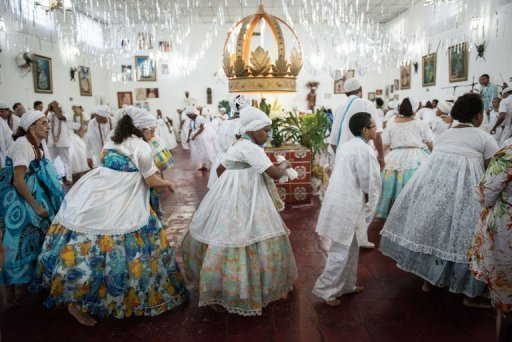
Doctors told Julio Penna in 1976 that he needed to undergo corrective spine surgery but faced an 80 percent chance of being condemned to life in a wheelchair.
Penna refused and instead sought help from Candomble, Brazil’s Africa-rooted religion based on worship of deities known as orishas that link humans to the spiritual world.
Today, the 69-year-old, who is of Italian and Portuguese descent, is walking unhindered and is a high-ranking disciple of a faith that has a powerful hold on many Brazilians of all races in the world’s biggest Catholic country.
Despite lingering prejudice and intolerance, mainly from evangelical extremists, Candomble and the related faith of Umbanda are attracting a growing number of followers across this vast country of about 190 million.
People often turn to the two faiths to seek relief from pain or to embark on a spiritual quest, practitioners say.
Telma Witter, a 57-year-old artist, said her husband turned to Candomble as a last resort when he was dying from an auto-immune disease.
“He was able to live an extra four years. That convinced me,” she told AFP.
A white Brazilian, she fully embraced the faith after reading the works of the late French anthropologist Pierre Verger, a respected practitioner himself who also did extensive research on Candomble both in Brazil and Africa.
Penna and Witter are followers of Mae (Mother) Sylvia de Oxala, a 75-year-old Candomble high priestess who runs the Axe Ile Oba temple in Sao Paulo’s Jabaquara district.
In April, Mae Sylvia — a mix of spiritual guide, faith healer and community leader — and her disciples held an open house to honor the deity Oxossi, one of 16 orishas in West Africa’s Yoruba mythology.
For hours, devotees in brightly colored garb, including women in billowing hoop skirts, chanted in the Yoruba language and danced around a sacred altar to the pulsating beat of ceremonial drums, with some falling into a trance as spirits apparently took possession of their bodies.
— Candomble: An Africa-rooted faith —
Developed by African slaves brought to Brazil from the 16th century, Candomble has various branches (Ketu, Nago, Angola, Jeje) based on the beliefs of these distinct ethnic groups. It also incorporates elements of Catholicism, with some orishas paired with analogous Christian saints.
Trained in Nigeria in the Ketu (Yoruba) branch of the faith, Mae Sylvia has over the past three decades tutored nearly 3,000 disciples, many of whom went on to open their own temples across the country.
“We have black, white, indigenous and even Japanese members. We are open to all,” she told AFP. “Every human being has within himself the axe (energy) of the orishas, but that powerful life force needs to be harnessed and developed.”
Mary Yamanaka, a 60-year-old Japanese Brazilian artist, said she joined the temple last year, attracted by the aesthetic appeal of the rituals, which can include animal sacrifices, essentially to please the orishas.
Mae Sylvia provides spiritual guidance to devotees, communicating with the orishas through divination based on shell reading and numerology.
